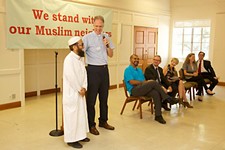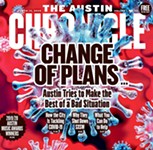Point Austin: Welcome to Hard Times
Austin Interfaith's economic summit, from the top and bottom
By Michael King, Fri., Feb. 13, 2009

Those were among the closing inspirational words of Ernesto Cortes Jr., founder and director of the Southwest Industrial Areas Foundation, parent organization of Austin Interfaith. Cortes was in town Saturday morning for AI's Central Texas Economic Summit, co-sponsored by Catholic Charities and held at the new Catholic Diocese of Austin Pastoral Center. The formal purpose of the meeting (in the language of the AI press release) was "to discuss and commit to a joint set of priorities to address workforce and education needs for a changing economy." In actual practice, the event functioned emotionally as a circling of the wagons against the gathering economic storm. And while the prevailing AI ethos was sturdily defiant and forward-looking, nobody who rose to speak could ignore the elephant in the room: Hard times have come to Austin.
About 120 people attended, including such a swarm of local officials that it was difficult to tell the leaders from the "leaders" (as AI calls all its members) without a program. Bishop Gregory Aymond delivered the invocation, and at least three City Council members (Laura Morrison, Randi Shade, and Mayor Will Wynn) showed and spoke briefly; state Rep. Mark Strama weighed in on the economic offshoots of renewable energy; there were suits from various foundations, United Way, Austin Community College, somebody from U.S. Rep. Lloyd Doggett's office, even a banker or two, and the numerous churches and schools that form the core of the organization – indeed, if every one of the three dozen or so promised big shots had turned up, they couldn't have all fit in the room.
A panel of designated local experts briefly addressed the state of the regional economy and their projects to improve it. Greater Austin Chamber of Commerce President Mike Rollins spoke primarily about Opportunity Austin, the chamber's ongoing effort at job creation, emphasizing that the program is aimed at creating employment opportunities "all along the ladder," from high school on up. Susan Dawson, executive director of the E3 Alliance ("Education Equals Economics"), focused on connecting local educational institutions with the actual work force needs in the community, and she noted that in recent years, because of technological advances, "the level of skills we need has gotten drastically higher." Fulbright & Jaworski attorney and economic rainmaker Pike Powers designated his own "E3" – "energy, environment, and economy" – in suggesting that Austin's way out of the current crisis, and more specifically the local downturn in the semiconductor industry, lies in the new green economy, a "greenbelt coalition" of renewable energy. He argued that Central Texas has always done better than most U.S. regions in hard times and declared: "I'm not here to be the prophet of gloom and doom. ... If anybody can do this, we can."
Home Truths
It all sounded plausible and inspirational enough, although the obligatory impulse to invoke optimism tended inevitably to suggest its opposite: If the middle class is always rising, why are we all treading water as fast as we can?
That uneasiness surfaced much more directly in the brief, informal "house meetings" held at 10 tables around the room. Participants were asked to share their own, familial situations. Their stories were various in detail and level of seriousness but had a common thread: Everyone is feeling the economic crisis in some form. There are lost jobs, growing expenses, and a growing inability to find the sort of supplemental income that tides families over in hard times. Unexpected medical expenses threaten one family; another finds its taco-truck business undercut by the cutbacks putting their customers, construction workers, out of work; a charitable nonprofit is abruptly short on donors; an experienced high tech engineer is watching his six-month severance disappear and wondering if it isn't about time to consider another economic system. "I'm wondering if it's a mistake," he says, "to try to plug myself back into a system that is so fundamentally dysfunctional." We ought to be thinking, he says, of ways to localize investment and finance, of less reliance on the whims of global corporations, and of locally grounded ways of building a sustainable economy.
The personal anecdotes served both to amplify and undercut the grand economic plans described as the meeting began. While local officials are understandably focused on the mid- to long-term, trying to establish projects and jobs sufficient for the next decade, most ordinary, working-class folks are stuck in the day-to-day: How are our families going to make it through this year and next?
Power and Liberation
If there were lessons in the distance from the experts to the cheap seats, at least one is that weird and wired Austin is hardly immune to the international economic meltdown. We may not be Elkhart or Fort Myers, but as Education Austin's Louis Malfaro emphasized after the discussions: "Don't kid yourself. The crisis is in Austin. It's here." And in that increasingly desperate short term, we're waiting on the federal government and the state of Texas to do what they can to fill the widening, perhaps two-year gap between recession and recovery. "The last thing that we need," said Malfaro, referring both to the various officials in the room as well as to the current legislative session, "is for government to cut services."
Addressing the morning's mood, Cortes reiterated that "private pain must be translated to public action" and that whatever the personal experience and expert knowledge in the room, "insight never liberated anybody; we must have active imagination in order to find solutions." It was in this context that he counseled the whole group against the temptation of despair, the willful hopelessness that corrodes the spirit.
All in all, it was a somber but educational morning, carrying along with it what Cortes calls the "iron rule" of community organizing, brought forcefully home: "Never do for anybody what they can do for themselves."
Consider it our charge.
Got something to say on the subject? Send a letter to the editor.











